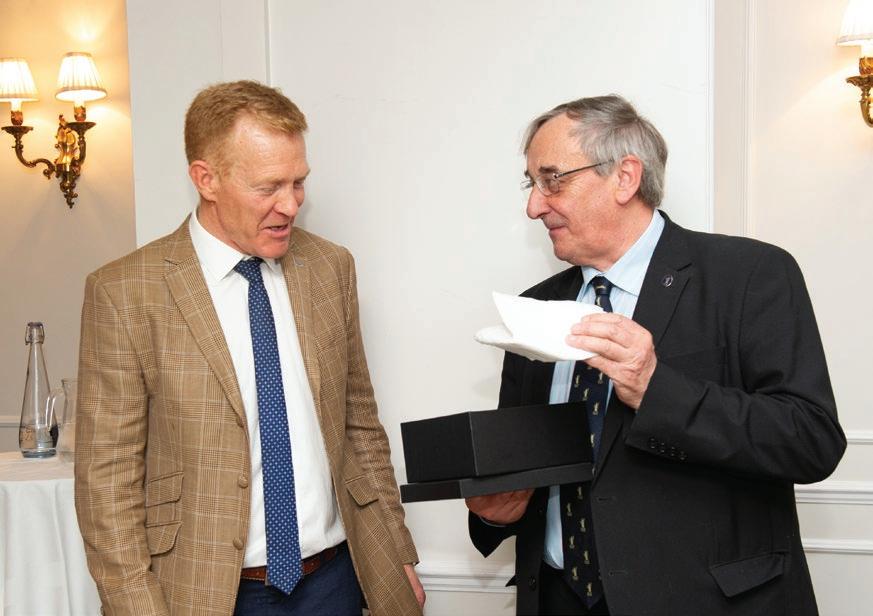
3 minute read
St George’s Day Lunch
Members and guests enjoyed a memorable time celebrating St George’s Day in The Club, with Britain’s best known farmer delivering a splendid talk full of passion, insight and inspiration.

Club Chairman Meurig Raymond welcomed an audience from across the country, and especially guest of honour and after-lunch speaker, Adam Henson, a Club member, BBC Countryfile presenter and owner of the very successful Cotswolds Farm Park.


As lunch in The Farmers Suite finished Meurig introduced Adam, who admitted to some trepidation. Addressing 5 million Countryfile viewers was nothing compared to talking to such a knowledge audience, he noted. “If you have any leftover chocolates, please don’t throw them at me!”
5 million viewers
Born on a tenant farm in the rolling Cotswold hills he wanted to be involved in farming ever since he could remember. His father, Joe, fully immersed him in all the practicalities from the outset, never hiding the grittier aspects of farming, wildlife and conservation.
At the bottom line it was a business, he stressed. “Farming is a way of life and a privilege too, but it has to be a business, and has to be driven forwards, onwards and upwards, using technology, research and development.”
In 2001, post foot-and-mouth, Adam started with Countryfile, the most watched factual programme on UK television. Each week he explains the intricate ways farmers work to provide quality food at affordable prices, whilst protecting the environment, the climate and the planet, and never shying away from the sector’s tougher realities.
Farming as a brand
“Viewers want to see farming, we’re popular again,” he enthused. But to make the most of that farming needs a clearer brand, in terms of vision, mission and values. Don’t be shy about talking about profit, he added. It is needed to avoid corner cutting and mental health pressures. “Being successful shouldn’t be an embarrassment. Being able to communicate a message about a profitable business is key.”
Farming’s inextricable link to the nation’s health also needs attention. Obesity is massive, but 13.1m UK people also face food poverty. He was sharply critical of Government’s failure to connect health policy to farm policy – “they should be side by side – we are what we eat”.
Never forget the diversity of the audience, he added. Grand schemes promoting ‘eat British’ can miss the mark. “We have to talk in the right way, because a lot of our consumers haven’t got a clue.”
Talk about positives to combat anti-farming social media echo chambers, with lots of small messages, he urged. Carbon footprints should be examined too, especially as alternatives to meat and milk, like imported soya, avocados and almonds, are so much more damaging.
Legislation may be frustrating, but should be a soapbox to stand on when arguing against cheap food imports, which could cripple UK farming under new trade deals, he felt.
Competing demands for land also merit scrutiny. “There’s a danger that the economics will change the way we manage our land and then where will the food come from. Food security needs to be seen as a top priority.”
Telling a great story
Adam’s forebears honed their story-telling skills in the entertainment industry, his grandfather Lesley working alongside Ginger Rodgers and Fred Astaire, playing for troops during the war, and entertaining King George VI, the late Queen Mother, and a very young Queen Elizabeth II.
But Adam’s father, Joe, also hankered after a farming life. The Cotswolds beckoned and Joe directed his communication skills to a creating a farm park, which also provided livestock for major films like “Braveheart”.
Over the years Joe showed Adam how to farm, and how to explain it to the public. “Food was a hot topic post-war, and it is becoming so again now, something the Government should have at the top of its agenda.”
In its first year the farm park had 50 breeds of seven livestock species, with entry priced at 50p for children and £1 for adults, drawing 20,000 visitors. Footfall now tops 185,000 a year, although entry costs “a little more”.
“Surrounding yourself with people who are good quality, who complement your skills, and have better skills, can take your business in the right direction.” The business has 13 managers and 100 staff, with the farm sharing equipment with a neighbour, which has seen contracting work expand to 4500 acres, spreading the cost of the latest technology over a wider area.
Looking after the environmental impact of inputs, optimising yield and protecting the bottom line, all depends on technology. So education, to equip a future workforce, is vital, Adam noted. “The technology is extraordinary, and the opportunities for rewarding careers are huge, which we have to get across. We need to do more to tell our story.” A GCSE in agriculture, land use and conservation would help.
Sustainability, the ability to last, is key. Environment lies at the heart of it, but it is also about relationships – to family, workers, friends and most of all customers. Better business relationships are coming back into play, replacing the cut-throat, undercutting approach of recent decades, he felt.
Thunderous applause concluded a truly vigorous talk, with Meurig presenting Adam with a pair of Farmers Club tumblers in thanks. In the Bar and on the Terrace conversations continued until well into the evening.









